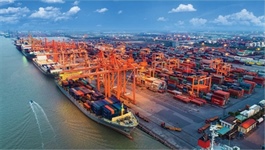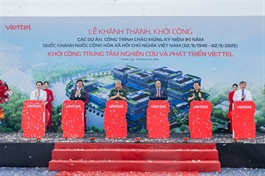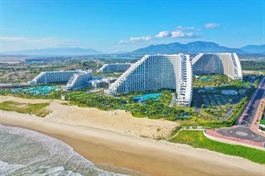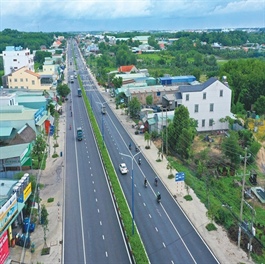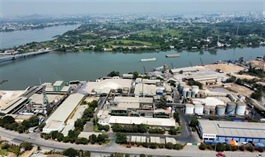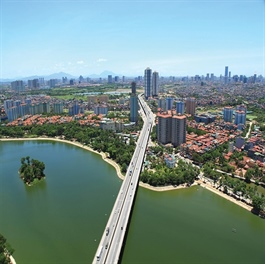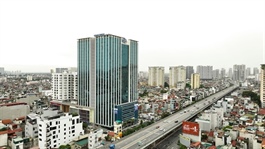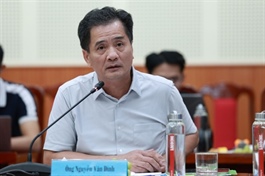Green IPs to entice strategic funding
Green IPs to entice strategic funding
Foreign firms in Vietnam are placing a focus on sustainable development in their performance strategies, with the undertaking of greener initiatives.
On August 19, CNCTech held the groundbreaking ceremony of the Nam Binh Xuyen Green Park, located in the northern province of Phu Tho.
Developing a new generation of green and smart industrial parks (IPs), the Nam Binh Xuyen Green Park is a testament to the trend of integrating advanced management technology with sustainable development in industrial real estate.
The initiative features a centralised AI integrated management system that operates 24/7, serving as the management and coordination platform for the entire park. The system enables real-time, centralised monitoring of critical areas such as electricity, water, security, environmental treatment, and logistics coordination.
In terms of energy, all factory buildings within the IP are designed to accommodate rooftop solar power systems.
In early August, the People’s Committee of Tay Ninh province held a similar ceremony for Thu Thua IP infrastructure. This is the first new IP in the Mekong Delta province following the merger of Long An and Tay Ninh, marking a significant starting point in the local industrial development strategy, and serving as a gateway connecting the southeast and southwest regions.
According to the plan, the IP will seek to entice industries such as processing and manufacturing, supporting industries, electronics, logistics, and high-tech agriculture, contributing to the formation of a modern production value chain.
Elsewhere, Dong Nai province next to Ho Chi Minh City is preparing for the construction of three new IPs - Long Duc 3, Bau Can-Tan Hiep, and Xuan Que-Song Nhan - which are expected to commence construction by the end of this year, adding hundreds of hectares of industrial land. These projects are planned from the outset to follow an eco-friendly and green logistics approach, applying smart management technologies to reduce operating costs and enhance production efficiency.
“Developing green and smart IPs will generate a competitive advantage in attracting foreign-invested capital, especially from multinational groups, which have commitments on greenhouse gas (GHG) mitigation. In addition, this trend is also matched with Vietnam’s strategy in luring investors using high-tech manufacturing lines,” said Nguyen Thi Dung, vice president of the Vietnam Industrial Real Estate Association.
Vietnam is increasingly seen not only as a strategic production base but also as a key link in global sustainability strategies, with multinational corporations committing multimillion-dollar investments to green and environmentally friendly manufacturing.
Coca-Cola inaugurated its new manufacturing facility in Tay Ninh a month ago, a $136 million, 19-hectare venture with an annual capacity of one billion litres.
According to Milly Cheng, general director of Coca-Cola Vietnam, the significance of the project lies not in its scale of investment but in its innovative design and operations. The Tay Ninh facility has been awarded LEED Gold certification, a rigorous global benchmark for environmentally friendly construction and operation.
Equipped with five advanced production lines, the factory is designed to maximise efficiency while reducing environmental impact. The plant runs partly on biomass energy, contributing to Coca-Cola’s global ambition of net-zero carbon emissions, while lowering operational costs. In addition, a rooftop solar system with a capacity of 6MW supplies clean and stable energy for the factory’s core operations.
“Its new packaging format cuts plastic use by up to 38 per cent per bottle across carbonated products, meeting growing consumer demand for sustainable solutions and streamlining supply chains,” she said. “These initiatives not only align with sustainability trends but also open new business opportunities.”
Beyond its production facilities, Coca-Cola is extending its sustainability footprint to the local community. The company, in collaboration with Rize Vietnam and Ben & Archie, has launched the EkoClimate programme in Tay Ninh. The initiative helps farmers adapt to climate change by applying alternate wetting and drying irrigation methods and stricter residue control.
To date, 42 farming households across 50ha of rice fields have benefited, achieving a 30 per cent reduction in production costs while cutting GHG emissions and improving crop value.
According to the United Nations Conference on Trade and Development (UNCTAD), over 60 per cent of multinational corporations prioritise environmental, social, and governance (ESG) criteria in new investments across Southeast Asia. UNCTAD data shows that one-quarter of registered foreign direct investment in 2024 went to ESG-related projects.
“The return of large-scale foreign-invested ventures in the first half of 2025, such as the $1 billion polyester recycling complex from a Swedish investor in Binh Dinh, sends a strong message about the new investment trend. This venture has a billion-dollar capital scale in the field of modern, environmentally friendly recycling technology. This is a clear demonstration of Vietnam’s attractiveness to large, high-tech and green projects,” said Pham Quang Long, sales director in Vietnam for US group Allied Moves.
"Developing green and smart IPs will generate a competitive advantage in attracting foreign-invested capital, especially from multinationals." - Nguyen Thi Dung, vice president Vietnam Real Estate Association
- 10:55 25/08/2025








